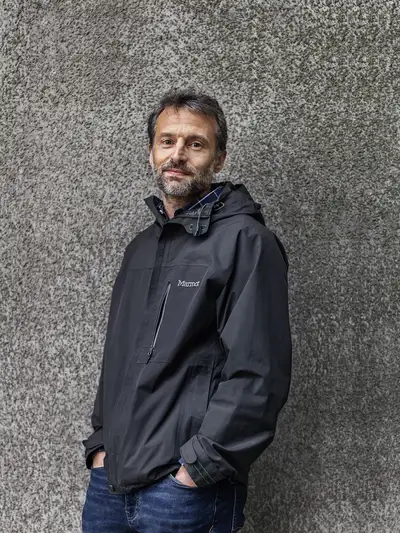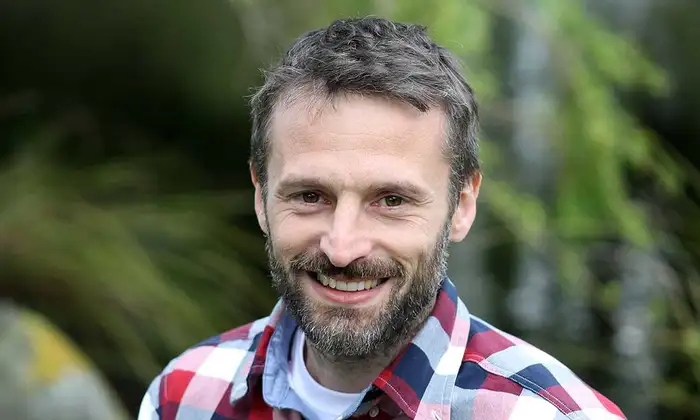Nearly all infectious human diseases have ancestry in another species but have crossed over to us, often through complex processes. The Covid-19 pandemic and the mystery around its origins have highlighted a question that researchers have long grappled with: what leads to the emergence of infectious diseases? Increasingly, it is becoming clear that the myriad effects of human activity on the environment have a key role.
The aim is to understand interrelationships between agents of disease

Professor David Hayman, Tāwharau Ora School of Veterinary Science
Professor David Hayman from Tāwharau Ora School of Veterinary Science takes a holistic view of the drivers and steps involved in the emergence of infectious diseases. ‘It is not just a human health issue,’ he says. Infectious diseases can show how interconnected humans are with the rest of the planet. I come from a veterinary background, and I have a strong interest in ecology and conservation. I study across different scales, from landscape-level changes like deforestation to local issues like the consumption of wild meat. The aim is to understand the interrelationships between these and disease.’
Professor Hayman has worked with the World Health Organization on the origins of Covid-19, a project which highlights the complexity of virus emergence. ‘There are numerous possible ways that SARS Coronavirus 2 could have got into the human population,’ he says. If it came from an infected animal in a market, he adds, there could have been multiple causative factors. ‘What leads to people being in a place at the right or wrong time, and what leads to intensification of wildlife farming as a food source? There are lots of interconnected ideas.’
Covid-19 may be dominating the world news, but it is far from exceptional: epidemics of diseases such as Ebola, Zika, monkeypox and influenza have been increasing in frequency. ‘There have been a number of awful outbreaks of infectious diseases, but since they haven’t really affected high-income countries they tend to be somewhat ignored,’ says Professor Hayman.
Research is showing that human activity that leads to other global issues also increases the chances of disease outbreaks. Ebola virus emergence in tropical parts of Africa, for example, can be linked to forest fragmentation and forest degradation, which are also issues for biodiversity and conservation. As humans encroach into areas such as forests in the tropics, where traditionally there have been low population densities, new emerging infections occur as a result of new interactions. ‘Many of these may infect just one or two people, but some of them take off,’ says Professor Hayman. ‘Ebola and Covid-19 are just the tip of the iceberg.’
In Uganda, Professor Hayman and colleagues have been looking at hotspots of forest fragmentation and increased human population density, and finding that these processes are factors in disease emergence. Their Ugandan collaborators have a long-running project, Conservation through Public Health, that involves working in communities, documenting people’s contacts with wildlife, their behaviours, and health information, then collecting samples from both people and animals to see if they are sharing pathogens. ‘The aim is to try to identify particular behaviours that might lead to increased risk of disease transmission between humans and animals,’ says Professor Hayman.
Large-scale outbreaks, he says, can be influenced by local decisions – such as whether to get vaccinated or choosing what to eat. ‘Equally, there are lots of top-down things that also drive those behaviours. A lot of behaviours associated with disease emergence are due to poverty. That’s where we need to work with anthropologists and social scientists and think about the bigger drivers of these situations. Those are complex issues themselves. Our collaborators in Uganda do a lot of work around education, family planning, alcohol use and health, and conservation – trying to put them all together. If you’re poor, you’re more likely to get an infectious disease, and if you get an infectious disease you’re more likely to be poor because you can’t work. Once you’re poor it’s really hard to get out of it.’
Professor Hayman points out that solving the issues that lead to disease emergence is even harder than understanding them. ‘It becomes more a human problem and less a biological problem. Increasingly, I work with those in other fields, such as social scientists and policymakers. We’re trying to move away from a reductionist approach in which health is seen merely as the absence of a particular infection. There are multiple reasons why you can’t control an infectious disease. It is quite easy to point to poorer or middle-income countries, but we need to be very careful about blame because a lot of the issues come from things that rich countries are doing, like mining in parts of central Africa for phone and computer materials, or a demand for food that leads to land conversion for agriculture. We need to think along the whole chain about what we do. The same is also true for issues like climate change, the global biodiversity crisis and water quality issues. That’s where thinking holistically and about interconnectedness is crucial and can potentially lead to some interesting solutions that can help deal with one problem, but from which there will be multiple benefits.’
David Hayman
Learn more about the researcher exploring the origins of infectious diseases.

Professor David Hayman
Professor Hayman is Co-Director of Massey University's Molecular Epidemiology and Public Health Laboratory (mEpiLab), OIE collaborating Centre for Veterinary Epidemiology and Public Health. He is also a member of the Global Health Security Agenda Consortium (GHSAC).








